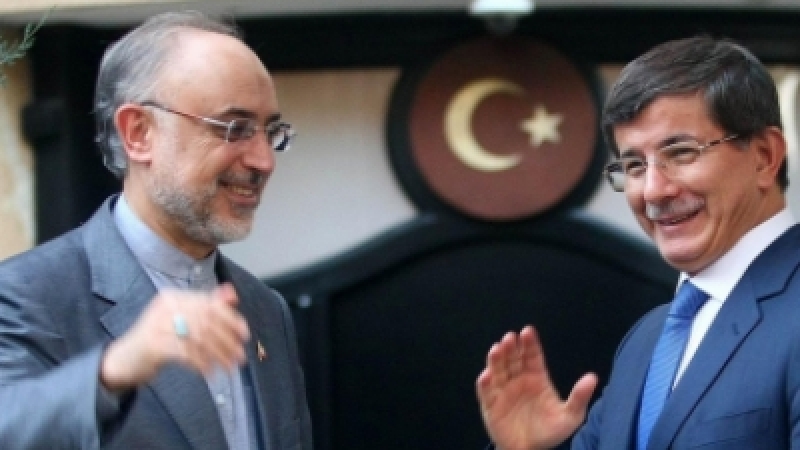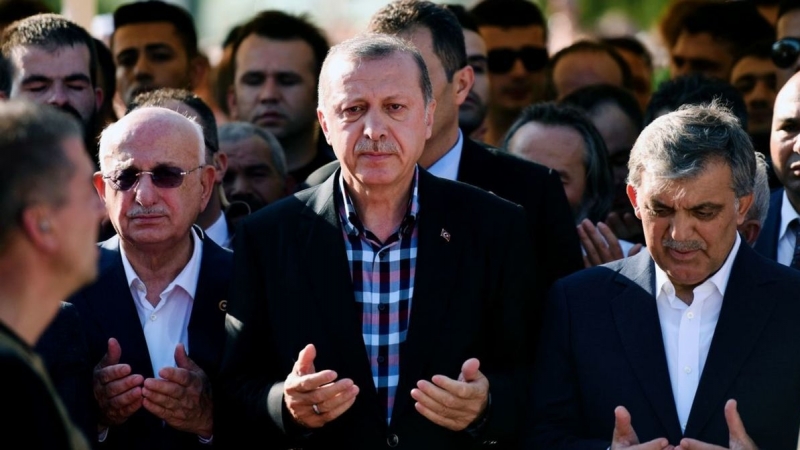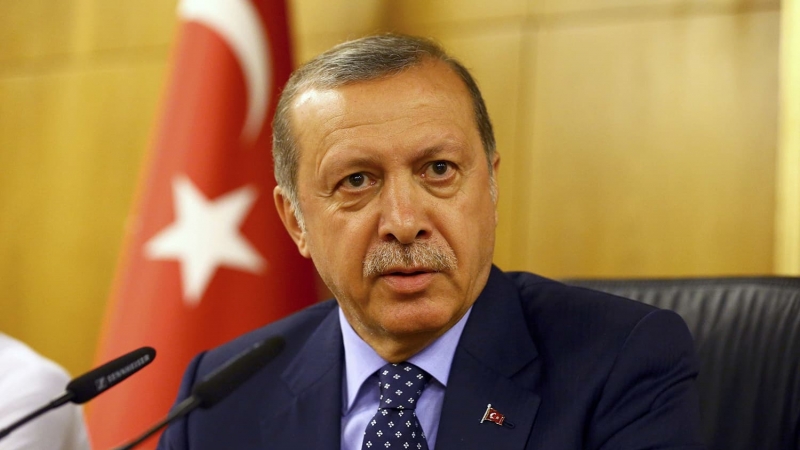Turkish dilemma after Mursi’s fall
Developing Just LeadershipAhmet Aslan
Ramadan 23, 1434 2013-08-01
News & Analysis
by Ahmet Aslan (News & Analysis, Crescent International Vol. 42, No. 6, Ramadan, 1434)

Turkish Prime Minister Recep Tayip Erdogan faces an acute dilemma now that President Mursi has been overthrown in a military coup. Erdogan had set up an alliance together with Qatar to act as policemen in the region. The alliance is now in tatters.
The ouster of President Mohamed Mursi through a well planned and executed military coup d’état in Egypt was like a tectonic shift that has again changed the political landscape of the region. Turkey is one of the most severely affected countries from this change. Since the beginning of the “Arab Spring,” Turkey’s Justice and Development Party that goes by its Turkish abbreviation, the AKP, has sided with the Muslim Brotherhood, and extended its economic and political support. Turkish policy makers considered the event as a great opportunity to exert Ankara’s influence in the Muslim East through working together with the Brotherhood.
To advance this agenda, Turkey formed a strong alliance with Egypt and Qatar. The axis presented itself as the most important regional bloc to influence regional affairs especially in Syria. Yet this began to change with the mass protests that took place in Cairo’s Tahrir Square, which then led to the coup. Prosecution and persecution of members of the Brotherhood followed. Aside from its national implications, the event also indicated a new power balance in the Muslim East.
The on-going rift between Qatar and Saudi Arabia is not a secret. The ambitious political and economic plans of the Qatari Emir Hamad bin Khalifa who abdicated in favour of his son in June, has long worried the Saudis. The Qataris seemed to overshadow the Saudis thanks to their ambitious political plans that are funded by vast natural gas reserves and a tiny population. Qatar had become a patron of the Muslim Brotherhood and the “Arab Spring,” and formed strong relations with Palestinian factions, especially Hamas by funnelling millions of dollars to the resistance group. Their unwavering support for Syrian rebels, especially the takfiri groups is particularly noteworthy.
Qatar’s money — its Sovereign Wealth Fund stands at $100 billion — was also very appealing for the growing Turkish economy, as Ankara desperately needs cash. In addition, their political ambitions and aspirations matched to a large extent, thus Turkey joined the Qatari axis and the two countries have been working hard to exert influence in the region.
The Saudis, however, who have always been suspicious of the Muslim Brotherhood and the AKP, were not happy with the change in the balance of power and they have been working hard behind the scenes to restore the status quo. The first blow came with the sudden retirement of Hamad bin Khalifa who appointed his son as his heir. The speedy handover of power and Saudi support for the son Tamim bin Hamad led many analysts to believe that the Saudis played a role in the leadership change in Qatar.
The following events reinforce this theory. First, in the July election to the Syrian National Coalition leadership in Istanbul, a secular tribal leader Ahmed al-Assi al-Jarba defeated candidates supported by Qatar and Turkey. Further, with the strong backing of the Saudis and members of the Gulf Cooperation Council (excluding Qatar) the Egyptian army ousted President Mursi on July 3.
Although Qatar under the new leadership seems to have accepted the ground reality in Egypt, Ankara is furious at losing its most important regional partner and has been desperately trying to reverse the situation. As soon as news of the coup broke out, Turkish Prime Minister Recep Tayyip Erdogan immediately returned to Istanbul cutting short a family holiday and held an emergency meeting with his cabinet and advisors. In the days that followed, Erdogan made clear that Turkey will not accept the coup and has demanded that Mursi must be reinstated to office. On various occasions Erdogan has condemned the coup in the strongest possible terms and called the Egyptian army “killers of democracy.”
Further, Erdogan took the opportunity in an iftar program with diplomats of foreign countries to expose their double standards. In his speech, he called the intervention “unacceptable” and blamed Western governments of double standards, “Countries which embrace and care about democracy should not behave with double standards toward these kinds of events [in Egypt] and should say something is wrong when it is wrong. Those who praise democracy when they meet with us, saying ‘one must not compromise on democracy,’ we want to see their backbone [in the case of Egypt]…”
No one can deny Erdogan’s shrewdness and the frank manner in which he exposed Western hypocrisy but one must also acknowledge that perhaps some Western governments may also have been taken by surprise by Mursi’s sudden overthrow. Could that explain why they did not show much reaction? Western politics, however, are based on pragmatic self-interest and Western governments do not have much to lose with the fall of Mursi but Turkey has a lot to lose. Since Mursi’s election and assumption of the presidency, Turkey had allocated $2 billion credit to Egypt which was the largest amount after Qatar’s commitment of $8 billion. The AKP government paid high profile visits to Cairo and secured many agreements and contracts with Egypt. Moreover, they had common approaches to many regional issues such as the Palestinian-Israeli conflict, Syrian civil war etc. These relations were especially important for Turkey given its abysmal status with other neighbouring countries: Syria, Iraq and Iran. It gave Turkey desperately needed space to manoeuvre to face regional developments.
Further, the strategic relations between the two countries strengthened Turkey’s influence in the region, especially its hand over Israel. With the fall of Mursi, Turkey has lost its strategic advantage and has been left quite isolated. On the one side are Syria, Iraq and Iran and on the other Saudi Arabia and the members of Gulf Cooperation Council, leaving Turkey in a very difficult situation. In this regard, Iranian Foreign Minister Ali Akbar Salehi’s visit to Ankara was timely. On July 12 he paid a one-day visit to Ankara to meet his counterpart Ahmet Davutoglu. Although details of the meeting were not revealed, both officials confirmed that they had discussed regional developments especially Egypt and Syria. It has been noted by the media that they were very friendly and warm; they even held each other’s hand for a very long time in front of the cameras.
Considering the strained relations between the countries following the eruption of the Syrian crisis, this was rather unusual and led some analysts to believe that there could be rapprochement between them. Tehran and Ankara are on opposite sides in the conflict in Syria but they seem to have common interests in Egypt. Iran strongly backed the revolution against Hosni Mubarak — an archenemy of Iran; Tehran called the people’s uprising as “Islamic Awakening.” After Mubarak’s overthrow and with the ascension of the Brotherhood to power, Iran and Egypt re-established relations (they were not elevated to exchange of ambassadors yet) despite strong pressure from Qatar, and Mursi paid a visit to Tehran during the Non-Aligned States Summit in August 2012. While their differences remained, it was in the interest of Islamic Republic to work with Mursi and vice versa.
The Iranians are naturally concerned about Saudi interference in Egypt and along with Turkey, condemned the coup and called it an “unacceptable intervention.” While the Egyptian coup has strong ramifications for the entire region, it seems it reminded both Iran and Turkey that in the face of growing Saudi hostilities they need to work together to deal with issues affecting the Muslims. Further, the Turks also seem to have realized that a similar scenario could be implemented against the AKP and their “trusted” Western and Arabian allies would do nothing but watch their downfall.
Realizing this, perhaps Davutoglu wanted to send a strong message to the Saudis tht if they cause too much trouble for Turkey the latter has the option of joining the alternative axis that would have serious consequences for Saudi ambitions in the region.




